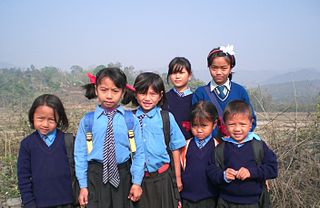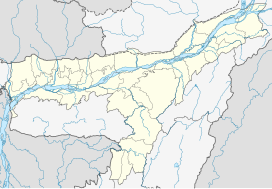
Reforestation is the practice of restoring previously existing forests and woodlands that have been destroyed or damaged. The prior forest destruction might have happened through deforestation, clearcutting or wildfires. Three important purposes of reforestation programs are for harvesting of wood, for climate change mitigation, and for ecosystem and habitat restoration purposes. One method of reforestation is to establish tree plantations, also called plantation forests. They cover about 131 million ha worldwide, which is 3% of the global forest area and 45% of the total area of planted forests.

The Brahmaputra is a trans-boundary river which flows through Southwestern China, Northeastern India, and Bangladesh. It is known as Brahmaputra or Luit in Assamese, Yarlung Tsangpo in Tibetan, the Siang/Dihang River in Arunachali, and Jamuna River in Bengali. It is the 9th largest river in the world by discharge, and the 15th longest.

Kaziranga National Park is a national park in the Golaghat and Nagaon districts of the state of Assam, India. The park, which hosts two-thirds of the world's Indian rhinoceroses, is a UNESCO World Heritage Site. According to the census held in March 2018 which was jointly conducted by the Forest Department of the Government of Assam and some recognized wildlife NGOs, the rhino population in Kaziranga National Park is 2,613. It comprises 1,641 adult rhinos ; 387 sub-adults ; and 385 calves.

Mājuli or Majuli is a large river island located in Assam, India. It is formed by the Brahmaputra River to the south and east, the Subansiri River to the west and an anabranch of the Brahmaputra River called Kherkutia Xuti to the North.

The Man Who Planted Trees, also known as The Story of Elzéard Bouffier, is an allegorical tale by French author Jean Giono, published in 1953. It tells the story of one shepherd's long and successful singlehanded effort to re-forest a desolate valley in the foothills of the Alps, near Provence, throughout the first half of the 20th century. It was written in French, and first published in English. The story has become known worldwide and is seen as an inspiration for ecological regeneration brought about by man. In 1988, Frédéric Back won an Academy Award for the animated short film The Man Who Planted Trees. The film was published in two versions, French and English, and narrated respectively by actors Philippe Noiret and Christopher Plummer.

Jorhat is an administrative district of the Indian state of Assam situated in the central part of the Brahmaputra Valley. The district is bounded by Majuli on north, Nagaland state on the south, Sivasagar on the east and Golaghat on the west. On the north of the district, the river Brahmaputra forms the largest riverine island of the world. The administrative seat is at Jorhat city.

Assam is the main and oldest state in the North-East Region of India and as the gateway to the rest of the Seven Sister States. The land of red river and blue hills, Assam comprises three main geographical areas: the Brahmaputra Valley which stretching along the length of the Brahmaputra river, the Barak Valley extending like a tail, and the intervening Karbi Plateau and North Cachar Hills. Assam shares its border with Meghalaya, Arunachal Pradesh, Nagaland, Manipur, Tripura, Mizoram and West Bengal; and there are National Highways leading to their capital cities. It also shares international borders with Bhutan and Bangladesh and is very close to Myanmar. In ancient times Assam was known as Pragjyotisha or Pragjyotishpura, and Kamarupa.

Satra are institutional centers associated with the Ekasarana tradition of Vaishnavism, largely found in the Indian state of Assam and neighboring regions. Numbering in the hundreds, these centers are generally independent of each other and under the control of individual adhikara, though they can be grouped into four different Sanghati (orders).

Sanjoy Ghose was an Indian rural development activist known for his pioneering contributions to community health and development media. He is believed to have been killed by United Liberation Front of Asom (ULFA) militants in the river island of Majuli on the Brahmaputra river around 4 July 1997.

Tom Cotter (born June 29, 1972) is an American conservationist, entrepreneur, renewable energy advocate, and ordained evangelical minister living in Clovis, California.

Jadav "Molai" Payeng is an environmental activist and forestry worker from Majuli, popularly known as the Forest Man of India. Over the course of several decades, he has planted and tended trees on a sandbar of the river Brahmaputra turning it into a forest reserve. The forest, called Molai forest after him, is located near Kokilamukh of Jorhat, Assam, India and encompasses an area of about 1,360 acres / 550 hectares. In 2015, he was honoured with Padma Shri, the fourth highest civilian award in India. He was born in the indigenous Mising tribe of Assam.

The Mising people are a Sino-Tibetan ethnic group inhabiting mostly in the Northeast Indian states of Assam and Arunachal Pradesh. They are part of the greater Tani group of people of India and Tibet Autonomous Region of China.

Ekhon Nedekha Nodir Xhipare is a 2012 Assamese language socio-political thriller film, with some dialogue in Hindi, starring Sanjay Suri and Bidita Bag in the lead roles. It was directed by Bidyut Kotoky and produced by National Film Development Corporation of India. The film was simultaneously made in Hindi as As the river flows.
Aarti Shrivastava is a national award-winning Indian documentary filmmaker and Asia 21 IPRYLI Fellow based in Mumbai.

Jorhat is a major city and a growing urban centre in the state of Assam in India.
Assam – 16th largest, 15th most populous and 26th most literate state of the 28 states of the democratic Republic of India. Assam is at 14th position in life expectancy and 8th in female-to-male sex ratio. Assam is the 21st most media exposed states in India. The Economy of Assam is largely agriculture based with 69% of the population engaged in it. Growth rate of Assam's income has not kept pace with that of India's during the Post-British Era; differences increased rapidly since the 1970s. While the Indian economy grew at 6 percent per annum over the period of 1981 to 2000, the same of Assam's grew only by 3.3 percent.
The Brahmaputra floods refers to a catastrophic flood event that occurred in 2012 along the Brahmaputra River and its tributaries, as well as in subsequent years.

The hill tribes of Northeast India are hill people, mostly classified as Scheduled Tribes (STs), who live in the Northeast India region. This region has the largest proportion of scheduled tribes in the country.
Tahir QureshiMangrove Man or Mangroves Hero of Pakistan was a senior Pakistani environmentalist and coastal ecosystem expert at the IUCN International Union for Conservation of Nature who dedicated his whole life to the preservation and expansion of Mangrove trees in Pakistan Indus River Delta-Arabian Sea mangroves and other coastal areas. Tahir Qureshi had played a key role in rehabilitation of more than 30,000 hectares of mangrove forests in Sindh and Baluchistan. International Union for Conservation of Nature awarded him title Hero of mangroves.
















